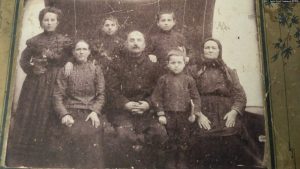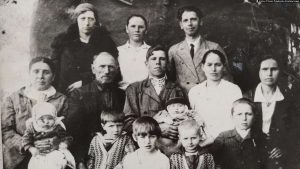The Resolution formally enshrined Stalin’s directives, voiced by the Soviet leader on January 21, 1930 in his appeal ‘On the policy of liquidation of the kulaks as a class’.
“In order to eliminate the kulaks as a class, it is necessary to openly break their spirit and resistance, and deprive them of the sources for further existence and development. The party’s current policy in the towns and villages marks a new procedure for eliminating the kulaks as a class,” said Joseph Stalin, secretary general of the Central Committee of the Communist Party of the USSR.
Stalin’s first objective was to rid society of the peasantry, which concealed ‘capitalist elements (kulaks)’, and was thus irrevocably hostile to the regime. Dekulakization consisted in expropriation, eviction of entire families, deportation of millions of farmers, and, in the event of resistance, physical annihilation.
This Resolution defined dekulakization quotas, i.e. first and second categories for each region or republic of the Soviet Union. The first category kulaks, defined as ‘activists, engaged in counter-revolutionary activities’, were to be arrested and sent to labour camps after a brief appearance before the so-called judicial ‘troika’. The most ‘dangerous’ activists were to be sentenced to death while second-category kulaks, defined as ‘exploiters, but less actively engaged in counter-revolutionary activities’, were to be deported to distant Siberian regions. Dispossessed, deprived of their civic rights, deported, exiled to remote areas of the USSR, these kulak families were assigned to ‘special villages’ run by the OGPU (NKVD as of 1934).
In January 2020 (90th commemoration of the total extermination of private property in the USSR), Radio Liberty and the National Museum of the Holodomor-Genocide launched a special project – ‘Dekulakization: how the Stalinist regime destroyed Ukraine’s free peasant class’. Hundreds of testimonies about dispossessed and persecuted families have been sent to Radio Liberty’s editorial office and been reprinted online.
Here are two more dekulakization narratives
From Natalia Sendetska
The photo shows the family of my great-grandfather Petro Stohov. It was taken around 1905-1907. They lived in the village of Doroshovka, Voznesensky district, Mykolayiv Oblast.

The family had some land. When my grandfather Illya Petrovych (young boy in the top row on the left) grew up, he and the other children inherited the land. He cultivated the land himself, but hired local peasants to help him during the harvesting season.
Of course, he became a so-called “kulak”. One day, the Soviet authorities arrived and evicted the family from their home.
Grandfather Illya was married then, and the couple had a young daughter. The land and property were confiscated, and his wife and family were sent to the Solovetsky Islands, Arkhanhelsk Oblast, Russia (Solovki prison camp was the first Gulag, established in 1923-Ed).
They were allowed to take only what could fit on the cart. The family travelled for months before reaching their destination in Solovki. Two boys were born in exile, but they didn’t live long…
It was only before WWII that the family was able to return home to Ukraine. They didn’t go back to Doroshovka, but settled in Luhansk Oblast, in the village of Bryanka, Kadiyevsky Raion. My mother was born there in 1939.
My grandfather was wounded during the war and received invalid status. When the war ended, the family really wanted to go home to Doroshovka. Through some acquaintances they learned that they were no longer in danger, so grandfather, his wife and two daughters travelled back to the village.
Of course, there was no talk of returning to their family home and reclaiming the land. With the help of the villagers, the family built a wattle and daub house in one week.
Grandfather Illya died in 1965.
I don’t know the other people in the photo, except for the little boy standing in the front. That’s Grandpa Arkhip. My grandmother and aunt told me that he was been taken prisoner during the war. Then the prisoners were released from the camp and herded on to a barge.
They were told that they were returning to the Soviet Union, but instead found themselves in Yugoslavia. Grandpa Arkhip remained there. Before the war in Yugoslavia, he sent New Year’s greeting cards to my grandmother and aunt. But, when the war broke out in Yugoslavia, all contact with him was lost.
I’m very sorry that I didn’t talk more with my grandmother or aunt in order to find out more about the past. Maybe my mother knew something, but she never wanted to talk about it.
I’m very grateful to you for organizing this project, because there are fewer and fewer eyewitnesses to recount what really happened in Ukraine during those dreadful years.
From Tamara Polyakovska
This family photo was taken in 1938-1939.

My great-grandfather, Frol Potapovych Omelchenko, was born in 1882 in Shamrayivka, Skvyrsky Raion, Kyiv Oblast. He was a farmer who never joined the kolkhoz (collective farm).
In 1930, the local authorities issued an order dispossessing him of all his property. He was rehabilitated in 1991.
I don’t remember my great-grandfather very well; he died when I was very young. But, I heard a lot about him from my grandmother, mother and my father. Therefore, when I look at my family photos, my great-grandfather appears alive and familiar.
Although great-grandfather Frol had only a 4th-grade pre-revolutionary education, he was able to solve complicated math problems, and helped his children with their homework. He worked very hard and raised his children the same way.
Great-grandfather Frol had a big family: his wife Anna Vasylivna Omelchenko (born Didkovska), born in 1888; children - Varvara, born in 1908; Ivan, born in 1910; Hryhoriy, born in 1912; Vasyl, born in 1914; Volodymyr, born in 1920; Anatoliy, born in 1928.
The family worked hard and lived fairly well. They had a farm and a horse. They built their own oil mill. Sometimes, they hired locals to help them during the harvests.
When the family heard that they were being dekulakized, they didn’t resist or beg the authorities to take them off the list. They were all in good health and willing to work anywhere in order to survive.
They packed their belongings and left their home with dignity. Volodya and Tolya, the two youngest children, were left behind with relatives. They were to join the others as soon as the family had settled in their new home. But, things didn’t turn out as expected.
The authorities escorted the Omelchenko family to the station and put them in a freight car packed with other “kulaks”. Nobody told them anything, where they were going, why they were going…
The train travelled far beyond the Urals. When it stopped, the people got out of the wagons and saw rows and rows of barracks, inhabited by the same kulaks. There was no land to cultivate, just lice, typhus and other “soviet benefits”.
There was no work for the women, while the men had to toil in logging. There could be no talk of building a private home. But, in reality, all these hard-working, independent Ukrainian farmers were taken there not to work, but to die.
After toiling for a month or two, the family decided again that Ivan and Hryhoriy would try to return home. They were afraid, because they had no documents, and they didn’t know what to expect in Ukraine.
When the boys finally arrived in their village, the neighbours and relatives were happy to see them; the authorities weren’t at all interested in them and left them alone. So, one by one, the other members returned home.
In the meantime, the Bolsheviks had destroyed everything. The oil mill was totally demolished and so was the new house, which my grandfather didn’t have time to complete. The communists had used it first as a first-aid station, and then abandoned it. It stood empty until it collapsed.
As part of a joint project with the National Museum of the Holodomor-Genocide - ‘Dekulakization: how the Stalinist regime destroyed Ukraine’s free peasant class’ - Radio Liberty asks families who know about their relatives being dekulakized to write and recount their stories. Important information to be included: names and surnames, age, number of family members and years of birth, children, place of residence (village, district, region), possessions (land, livestock, equipment, property), social status, hired workers, etc., as well as how they experienced and survived dekulakization. Facts, reactions and feelings are important. Please send all available photos and documents.
Please write to: [email protected]
TO BE CONTINUED…





